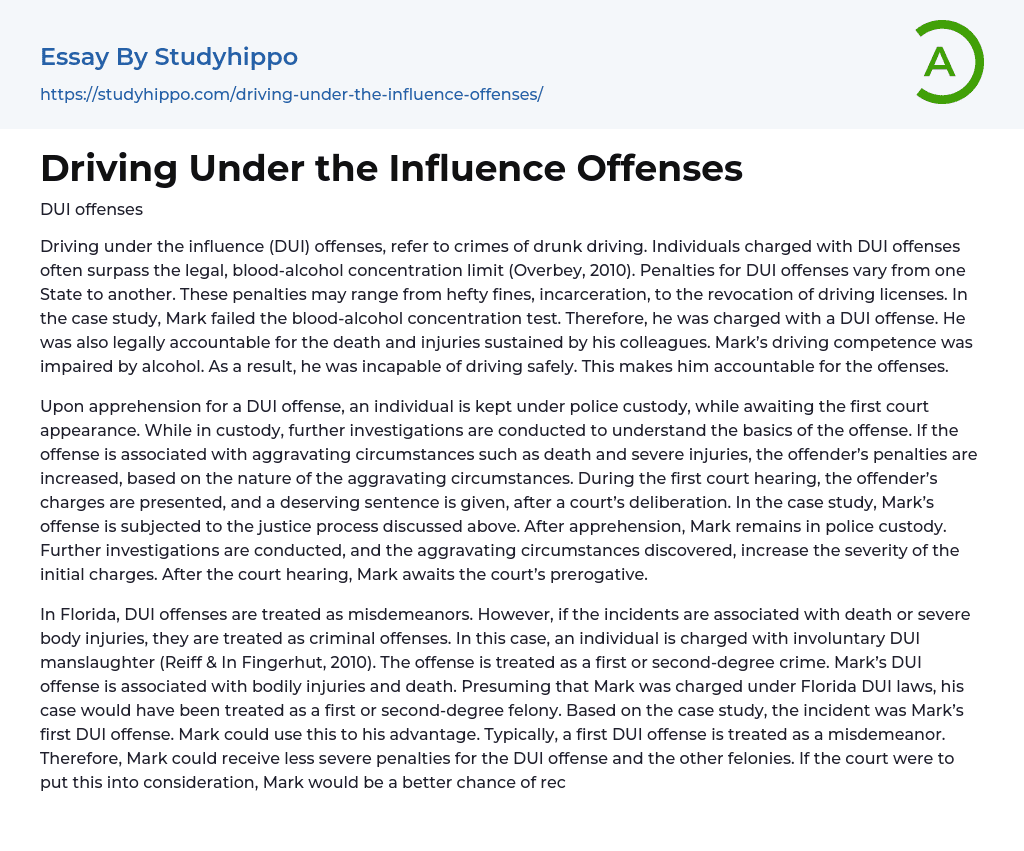DUI offenses
Drunk driving is a criminal act classified as a DUI offense.
Overbey (2010) states that individuals who are charged with DUI offenses frequently surpass the legal blood-alcohol concentration limit. The penalties for these offenses differ by State and can involve substantial fines, incarceration, and the loss of driving privileges. This particular case study focuses on Mark, who was accused of a DUI after failing the blood-alcohol concentration test. Furthermore, he bore legal responsibility for the harm caused to his coworkers resulting in death and injuries.
Mark's ability to drive safely was significantly impacted by alcohol, making him accountable for his actions. When an individual is apprehended for driving under the influence, law enforcement detains them until their initial court appearance. Meanwhile, further investigations take place to gain a deeper understanding of the nature of the offense.
...If a crime is committed with aggravating factors, such as resulting in death or severe injuries, the punishment for the offender will be increased. The severity of these penalties depends on the nature of these aggravating elements. During the initial court hearing, the accused is informed of the charges and a suitable sentence is determined by the court after careful consideration. In Mark's case, his offense follows this legal process. After being arrested, Mark remains in police custody while further investigations occur. If aggravating circumstances are discovered during these investigations, they result in enhanced severity of the original charges. Following the court hearing, Mark awaits the verdict from the court.
In Florida, DUI offenses are considered misdemeanors unless they cause death or serious bodily injuries. In such cases, they are treated as criminal offenses and the person responsible would be charged wit
involuntary DUI manslaughter (Reiff & In Fingerhut, 2010). The degree of the offense determines whether it is classified as a first or second-degree crime. In Mark's situation, his DUI offense led to bodily harm and death. If Mark were to be prosecuted under Florida's DUI laws, his case would be categorized as either a first or second-degree felony.
According to the case study, Mark's first DUI offense might actually have a positive outcome for him. Usually, initial DUI offenses are seen as misdemeanors and have less severe consequences compared to potential felonies Mark may have committed. Recognizing this fact could improve the chances of Mark receiving a more lenient sentence from the court.
According to Reiff ; In Fingerhut (2010), the primary challenge in pursuing this option would be the aggravating circumstances associated with the case. Victims of DUI offenses have a legal entitlement to compensation, particularly if they endure severe injuries. Nonetheless, there exists a specific timeframe for them to pursue their claims. Neglecting this deadline will lead to the disregarding of their rights to receive compensation.
Families who have lost a loved one can seek financial compensation through filing a wrongful death claim. As the defendant, Mark has certain rights including the right to remain silent, have legal representation, receive a prompt trial, and be provided with an attorney. The case study indicates that Mark's rights as a defendant were not violated. Compared to standard court procedures, the grand jury process is more efficient and speedy. In Mark's situation, the evidence would be promptly presented to the jury after his arrest (Diamond, 2014).
The prosecutor presents and explains the evidence to the jury, who then deliberates extensively
to determine if there is probable cause. If there is, a criminal is indicted. However, if there isn't, the case and allegations are disregarded.
References
- Diamond, P. S. (2014). Federal grand jury practice and procedure. Juris Publishing, Inc.
- Overbey, C. (2010). Drinking and driving war in America. Lexington, Ky: Lulu.
Reiff, R. S., and In Fingerhut, H. S. (2010). Drunk driving and related vehicular offenses.
- Texting And Driving essays
- Animal Cruelty essays
- Charles Manson essays
- Crime Prevention essays
- Crime scene essays
- Criminal Justice essays
- Criminology essays
- Cyber Crime essays
- Damages essays
- Detention essays
- Distracted Driving essays
- Drug Trafficking essays
- Drunk Driving essays
- Forensic Science essays
- Gang essays
- Hate Crime essays
- Homicide essays
- Identity Theft essays
- Juvenile Crime essays
- Juvenile Delinquency essays
- Juvenile Justice System essays
- Law Enforcement essays
- Murder essays
- Organized Crime essays
- Penology essays
- Piracy essays
- Prison essays
- Property Crime essays
- Prostitution essays
- Punishment essays
- Punishments essays
- Rape essays
- Robbery essays
- Serial Killer essays
- Sexual Assault essays
- Sexual Assault on College Campuses essays
- Sexual Harassment essays
- Sexual Offence essays
- Stealing essays
- Surveillance essays
- Ted Bundy essays
- Victim essays
- Violent crime essays
- White Collar Crime essays




